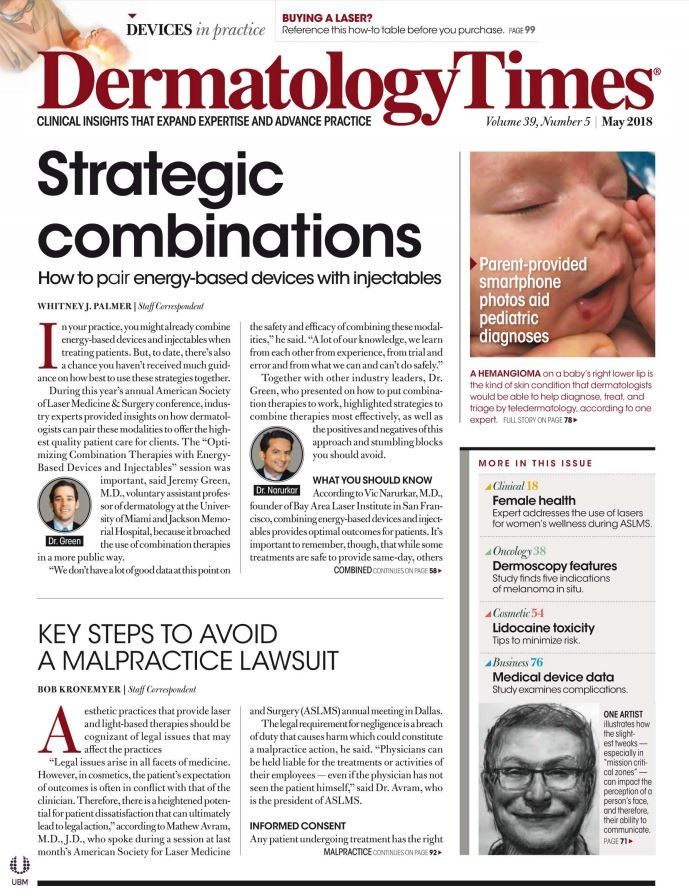- Case-Based Roundtable
- General Dermatology
- Eczema
- Chronic Hand Eczema
- Alopecia
- Aesthetics
- Vitiligo
- COVID-19
- Actinic Keratosis
- Precision Medicine and Biologics
- Rare Disease
- Wound Care
- Rosacea
- Psoriasis
- Psoriatic Arthritis
- Atopic Dermatitis
- Melasma
- NP and PA
- Skin Cancer
- Hidradenitis Suppurativa
- Drug Watch
- Pigmentary Disorders
- Acne
- Pediatric Dermatology
- Practice Management
- Prurigo Nodularis
- Buy-and-Bill
Publication
Article
Dermatology Times
Inhibitors found to benefit surgically resectable melanoma
Author(s):
Treatment significantly improved event-free survival in patients with high-risk, surgically resectable, clinical stage III and IV melanoma, researchers report.
Neoadjuvant targeted therapy with the BRAF and MEK inhibitors dabrafenib and trametinib prior to surgery significantly improved event-free survival in patients with high-risk, surgically resectable, clinical stage III and IV melanoma compared to standard-of-care surgery alone, researchers report in The Lancet Oncology.
“Although the trial finished early, limiting generalisability of the results, the findings provide proof-of-concept and support the rationale for further investigation of neoadjuvant approaches in this disease,” researchers wrote.
Led by Rodabe Amaria, M.D., of MD Anderson Cancer Center in Houston, this was a single-center, open-label, randomized phase two trial of seven patients to standard of care/consideration for adjuvant therapy and 14 patients to neoadjuvant plus adjuvant dabrafenib and trametinib.
The inhibitor group received 8 weeks of neoadjuvant oral dabrafenib (150 mg twice per day) and oral trametinib (2 mg per day) before surgery. Then starting one week after surgery, these patients were administered up to 44 weeks of adjuvant dabrafenib plus trametinib, for a total of 52 weeks of treatment.
Patients were stratified by disease stage. The primary endpoint was investigator-assessed, event-free survival: Patients who were alive without disease progression at 12 months in the intent-to-treat population.
After a median follow-up of 18.6 months, 71% of patients who received the inhibitors were alive without disease progression versus 0% in the standard of care group. The median event-free survival was 19.7 months.
The inhibitors were well tolerated. There was no occurrence of grade 4 adverse events or treatment-related deaths.
The most common adverse events in the group were expected grade 1–2 toxicities, including chills (92%), headache (92%) and pyrexia (77%), whereas the most common grade 3 adverse event was diarrhea (15%).
Study participants were adult with histologically or cytologically confirmed surgically resectable clinical stage III or oligometastatic stage IV BRAFV600E- or BRAFV600K-mutated melanoma.
In addition, eligible patients needed an Eastern Cooperative Oncology Group performance status of 0 or 1, a life expectancy of at least three years and no previous exposure to BRAF or MEK inhibitors.
REFERENCE:
Rodabe Amaria, MD, Peter Prieto, MD, Michael Tetzlaff, MD, et al. “Neoadjuvant plus adjuvant dabrafenib and trametinib versus standard of care in patients with high-risk, surgically resectable melanoma: a single-centre, open-label, randomised, phase 2 trial,”The Lancet Oncology. Published online January 17, 2018. DOI: https://doi.org/10.1016/S1470-2045(18)30015-9







